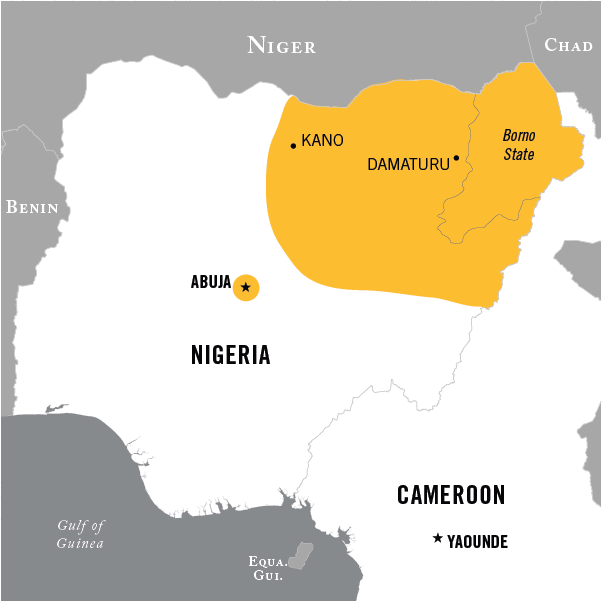Boko Haram Resurgence Threatens Stability in Nigeria
Boko Haram Resurgence Threatens Stability in Nigeria
Why in the News?
Boko Haram attacks have intensified in northeast Nigeria, raising fears of a return to peak insurgency. This short note on terrorism highlights how recent terrorist attacks, territorial gains, and use of advanced tactics by the ISWAP faction underscore challenges faced by the understaffed Nigerian military, exacerbating the ongoing Borno state insurgency.
Rising Threat and Factional Split:
- Boko Haram, one of the top terrorist groups in the world active since 2009, is again escalating violence in Borno state and nearby regions, including the Mandara mountains.
- A recent terrorist attack in Gajibo village killed nine pro-government militia members, demonstrating the group’s continued threat to civilian militias.
- The group has split into two factions, both considered dangerous jihadist groups:
○ ISWAP (Islamic State West Africa Province), aligned with ISIS, focuses on military targets.
○ JAS (Jama’atu Ahlis Sunna Lidda’awati wal-Jihad), also known by its full name Jama’tu Ahlis Sunna Lidda’awati wal-Jihad, targets civilians, engages in kidnappings and ransom.
Advanced Tactics and External Support
- ISWAP’s territorial expansion and decentralised operations allow simultaneous assaults.
- Tactics include night raids, light weapons assaults, and drones to drop explosives.
- External support from ISIS in Iraq and Syria has enhanced capabilities.
- Former militants, acting as informants or handlers, continue aiding insurgents.
Nigerian Military Struggles and Regional Impact
- Nigerian military bases are often understaffed, remote, and vulnerable to frequent overruns, highlighting ongoing Nigerian military struggles.
- Reinforcements arrive too late, allowing insurgents to steal weapons.
- At its peak (2013–14), Boko Haram controlled areas the size of Belgium and kidnapped Chibok schoolgirls.
- Borno’s Governor, Babagana Zulum, warned of a “daily dislodging” of army bases, threatening earlier military gains and intensifying the humanitarian crisis in the region.
- The situation has led to widespread food insecurity and displacement across northeastern Nigeria, Chad, and Niger.
- Efforts by the Multinational Joint Task Force, involving troops from Nigeria and neighboring countries, have had limited success in curbing the insurgency and preventing terrorist attacks.
About Boko Haram: |
| ● A Nigerian jihadist group founded in 2002, turned violent in 2009. |
| ● Aims to establish an Islamic state and opposes Western education. |
| ● Responsible for mass killings, abductions, and bombings. |
| ● Estimated to have killed over 35,000 people and displaced 2 million. |
| ● Operates across Nigeria and Lake Chad basin, including parts of Cameroon, Chad, and Niger. |
ISWAP (Islamic State West Africa Province):
- A splinter group of Boko Haram formed in 2016.
- Aligned with ISIS and operates mainly in northeast Nigeria.
- Targets military and government facilities using advanced weapons and drones.
- Known for strategic attacks and better organisational structure.
- Gained ground due to decentralised operations and external support.
JAS (Jama’atu Ahlis Sunna Lidda’awati wal-Jihad):
- Original Boko Haram faction led by Abubakar Shekau, the infamous Boko Haram leader.
- Focuses on civilian attacks, abductions, and ransom-driven operations.
- Less structured than ISWAP but extremely violent and unpredictable.
- Thrives on looting and exploiting remote communities.
- Often clashes with ISWAP over ideological and territorial differences.
- The JAS faction continues to be a significant threat in the region.
Borno State:
- Located in northeastern Nigeria, it is the epicentre of insurgency.
- Hosts towns like Gwoza, Dikwa, and Gajibo—frequent conflict zones.
- Scene of major Boko Haram and ISWAP activity.
- Displacement and destruction have crippled infrastructure and governance.
- Central to Nigeria’s counter-insurgency efforts.
Chibok Girls:
- Refers to the 2014 kidnapping of 276 schoolgirls by Boko Haram in Chibok, Borno.
- Sparked international outrage and the #BringBackOurGirls campaign.
- Some girls were later released or escaped; many remain missing.
- Symbol of Boko Haram’s brutality and the need for global intervention.
- Highlighted education insecurity in conflict zones.
The ongoing insurgency, particularly in the Sambisa forest region, continues to pose significant challenges for the Nigerian government and military. The situation has led to widespread civilian displacement and a growing humanitarian crisis in northeastern Nigeria. As Islamist terrorists like Boko Haram and ISWAP continue their attacks on army bases and civilian targets, the need for a comprehensive strategy to address the root causes of extremism and bolster regional security becomes increasingly urgent.
Recent attempts at negotiations with militants and programs to encourage defectors have shown limited success. The Nigerian government, under former President Muhammadu Buhari and current President Bola Tinubu, faces the challenge of balancing military action with diplomatic efforts to resolve the conflict. The rise of militant leaders like Ibrahim Bakura Doro within the JAS faction further complicates the security landscape, requiring a nuanced approach to counter-terrorism strategies in the region.
For those wondering what is Boko Haram, it’s important to understand that this jihadist group has evolved since its inception. Originally founded as a movement against Western education, it has transformed into one of the most dangerous terrorist organizations in Africa. The group’s split into ISWAP and JAS has further complicated efforts to combat their influence and prevent terrorist attacks.
The ongoing conflict between government forces and these jihadist groups, particularly the JAS militants, continues to destabilize the region. As the Nigerian military struggles to contain the threat, the international community watches closely, recognizing that the actions of Boko Haram and its offshoots have implications far beyond Nigeria’s borders.






